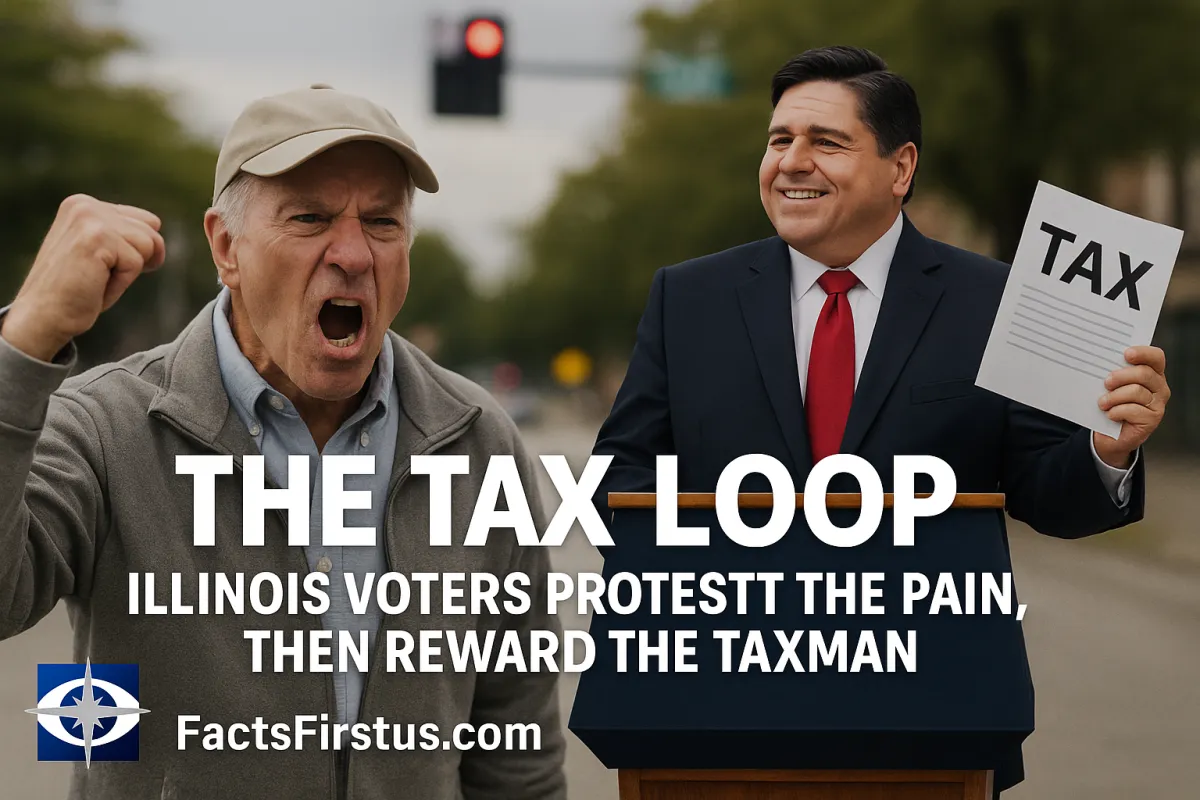
GOOD GRIEF, ILLINOIS: VOTERS HATE TAXES BUT KEEP VOTING FOR MORE
Illinois Faces Fiscal Flight: Voters Fume Over Taxes as Blue States Double Down on Spending
By Staff Writer
November 5, 2025
SPRINGFIELD, Ill. — At the city’s bustling farmers’ market, where the scent of cider mixes with the chatter of shoppers, 67-year-old retiree Harold Jenkins frowns at a basket of apples — 15% pricier than last fall.
“I’ve paid into this state my whole life,” says the former union mechanic.
“Now it feels like they’re coming for my Social Security next. We vote, we complain, and nothing changes.”
Jenkins’ frustration reflects a deepening fiscal fatigue across Illinois. While the state avoided major ballot fights this election cycle, new polling shows taxes have eclipsed every other issue for Illinois voters — fueling an exodus that’s reshaping the Midwest.
Polls Show Taxes Dominate Illinoisans’ Concerns
A statewide M3 Strategies / Illinois Policy Institute poll of 929 voters (Oct. 8–10) found 52% cite high taxes as Illinois’ top problem — far ahead of the economy (26%) or crime (9%).
Even in Chicago — the Democratic stronghold — a separate poll of 530 likely voters (Oct. 17–20) showed 35% now name taxes as their biggest issue, overtaking crime for the first time this year.
“Taxes? They’re death by a thousand cuts. Every grocery run, every utility bill — it’s relentless.”
— Aisha Patel, Chicago teacher
A State Losing People — and Patience
Illinois is bleeding residents faster than any other Midwest state. U.S. Census Bureau estimates show it lost one resident every 9 minutes and 21 seconds from mid-2023 through mid-2024 — over 420,000 people gone since 2020.
Chicago alone has shed 128,000 residents in the past decade, dropping to 2.58 million, its lowest level since the 1920s.
“People aren’t just complaining — they’re voting with their feet.”
— Elena Vasquez, Illinois Policy Institute
Many who leave head for tax havens like Tennessee or Arizona, where property and income taxes are dramatically lower.
Tax Hikes Keep Coming
Despite the exodus, Springfield and City Hall are pushing ahead with new levies. On October 31, the state legislature passed a transit rescue bill featuring toll increases on the Tri-State Tollway (up to $120 a year for heavy users) and a 0.25-point sales tax hike across Cook and collar counties.
In Chicago, Mayor Brandon Johnson’s proposed 2026 budget adds more than $500 million in new taxes — including surcharges on streaming services, ride shares, sports betting, and digital transactions.
“Great intentions,” Patel says. “But my intentions include keeping the lights on.”
Across the Border: Blue States Double Down
Illinois’ unease mirrors a national paradox. In New Jersey, 48% of voters said taxes were their top issue — yet Democrat Mikie Sherrill won the governorship 54%–42%, promising to maintain Phil Murphy’s 10.75% top income tax and add new business levies.
California and New York followed similar paths: despite 55% of Californians calling taxes “way too high,” Democrats expanded control, and New York City voters elevated progressive Zohran Mamdani to mayor on a pledge for “equity taxes” targeting the wealthy.
“Democrats dominate because Republicans are still seen as disorganized and anti-worker,” says Vasquez.
“People hate the taxes — but they hate the alternatives more.”
A Crisis of Affordability — and a Pension Time Bomb
National inflation has cooled to 2.7%, yet Illinoisans say life still feels expensive. The state’s property tax rate — 2.1% of home value — ranks among the nation’s highest, and its $140 billion pension debt keeps pressure on lawmakers to raise revenue.
“Even if you froze every tax tomorrow,” says Mark DeSantis, a DePaul University economist,
“the pension problem alone would keep Illinois underwater.”
Illinois’ pension crisis remains the hidden engine behind its tax burden. Decades of underfunding and skipped payments have left five state systems — covering teachers, state employees, judges, university staff, and lawmakers — among the worst funded in the nation, averaging around 44% funded as of 2025.
Repeated reform efforts have failed. The 2013 pension overhaul was struck down by the Illinois Supreme Court, and Gov. J.B. Pritzker’s 2020 “Fair Tax” amendment — which sought a graduated income tax — was rejected by voters. Without structural change, annual pension contributions keep rising, consuming nearly one-fourth of Illinois’ general budget.
That squeeze leaves little room for new spending without new taxes — and voters are noticing.
What Comes Next
As lawmakers prepare for the 2026 session, proposals to cap property taxes, restructure pensions, and link spending growth to inflation are expected to resurface — though insiders doubt much will pass before the next election.
Jenkins, the Springfield retiree, has already made up his mind. He and his wife plan to move to Paducah, Kentucky, early next year, where property taxes are 60% lower.
“Illinois raised me,” he says, apple in hand. “But it’s not raising my kids anymore.”
Sources
Illinois Policy Institute / M3 Strategies Polls (Oct. 2025)
U.S. Census Bureau, Vintage 2024 Population Estimates
Chicago Metropolitan Agency for Planning, 2024 Census Update
Associated Press Election Results Dashboard, Nov. 5, 2025
Edison Research / AP VoteCast Exit Polls, Nov. 4, 2025
Public Policy Institute of California Statewide Survey, Oct. 2025
Siena College Research Institute, Sept. 2025
New York Times, NYC Mayoral Results, Nov. 5, 2025

